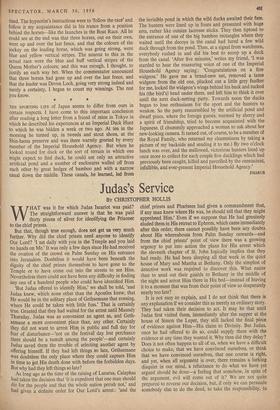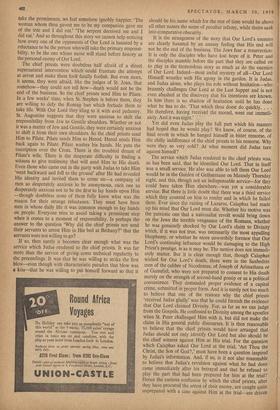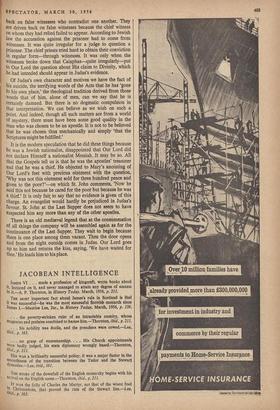Judas's Service
BY CHRISTOPHER HOLLIS WHAT was it for which Judas Iscariot was paid? The straightforward answer is that he was paid thirty pieces of silver for identifying the Prisoner to the chief priests.
But that, though true enough, does not get us very much further. Why did the chief priests need anyone to identify Our Lord? 'I sat daily with you in the Temple and you laid no hands on Me.' It was only a few days since He had received the ovation of the crowd on Palm Sunday on His entrance into Jerusalem. Doubtless it would have been beneath the dignity of the chief priests themselves to have gone to the Temple or to have come out into the streets to see Him. Nevertheless there could not have been any difficulty in finding any one of a hundred people who could have identified Him.
'But Judas offered to identify Him,' we shall be told, 'and Judas knew, which none other than the Apostles knew, that He would be in the solitary place of Gethsemane that evening, where He could be taken with little fuss.' That is certainly true. Granted that they had waited for the arrest until Maundy Thursday, Judas was as convenient an agent as, and Geth- semane a more convenient place than, any other. Certainly they did not want to arrest Him in public and full day for fear of disturbance—'not on the festival day lest perchance there should be a tumult among the people'—and certainly Judas saved them the trouble of selecting another agent by offering himself. If they had left things so late, Gethsemane was doubtless the only place where they could capture Him In time to get His death done with before the forbidden days. But why had they left things so late?
As long ago as the time of the raising of Lazarus. Caiaphas had taken the decision that 'it is expedient that one man should die for the people and that the whole nation perish not,' and had given a definite order for Our Lord's arrest : 'and the chief priests and Pharisees had given a commandment that, if any man knew where He was, he should tell that they might apprehend Him.' Even if we suppose that He had genuinely eluded them in His retreat to Ephrem, which came immediately after this order, there cannot possibly have been any doubts about His whereabouts from Palm Sunday onwards—and from the chief priests' point of view there was a growing urgency to put into action the plans for His arrest which the eleventh chapter of St. John logically implies that they had ready. He had been sleeping all that week in the quiet house of Mary and Martha at Bethany. Only the simplest of detective work was required to discover this. What easier than to send out their guards to Bethany in the middle of the night and arrest Him there in His bed—instead of leaving it to a moment that was from their point of view so desperately nearly too late?
It is not easy .to explain, and I do not think that there is any explanation if we consider this as merely an ordinary story. They had taken their decision to act. It may be that until Judas first visited them, immediately after the supper at the house of Simon the Leper, they still lacked the final piece of evidence against Him—His claim to Divinity. But Judas, once he had offered to do so, could supply them with the evidence at any time they wanted it. Why then did they delay? Does it not often happen to all of us, when we have a difficult choice to make, that we have convinced ourselves, or think that we have convinced ourselves, that one course is right, and yet, when all argument is over, there remains a lurking disquiet in our mind, a reluctance to do what we have yet argued should be done—a feeling that somehow, in spite of the argument, evil will come out of it? We are not quite prepared to reverse our decision, but, if only we can persuade somebody else to do the deed, to take the responsibility, to take the prominence, we feel somehow ignobly happier. 'The woman whom thou gayest me to be my companion gave me of the tree and I did eat.' The serpent deceived me and I did eat.' And so throughout this story we cannot help noticing how every one of the opponents of Our Lord is haunted by a reluctance to be the person who will take the primary responsi- bility, to be the one whose name will stand before history as the personal enemy of Our Lord.
The chief priests were doubtless half afraid of a direct supernatural intervention which could frustrate the attempt at arrest and make them look fatally foolish. But even more, it seems, they were afraid, like the judges of St. Joan, that somehow—they could not tell how—death would not be the end of the business. So the chief priests send Him to Pilate. In a few weeks' time, when St. Stephen is before them, they are willing to defy the Roman ban which forbade them to take life. With Our Lord they cling to it with avid pedantry. St. Augustine suggests that they were anxious to shift the responsibility from Jew to Gentile shoulders. Whether or not it was a matter of Jew and Gentile, they were certainly anxious to shift it from their own shoulders. So the chief priests send Him to Pilate. Pilate sends Him to Herod. Herod sends Him back again to Pilate. Pilate washes his hands. He puts the inscription over the Cross. There is the troubled dream of Pilate's wife. There is the desperate difficulty in finding a witness to give testimony that will send Him to His death. Even those who came out in the party with Judas to take Him 'went backward and fell to the ground' after He had revealed His identity and invited them to come on—a company of men so desperately anxious to be anonymous, each one so desperately anxious not to be the first to lay hands upon Him —though doubtless none of them fully knew what was the reason for their strange reluctance. They must have been men in whose daily life it was common enough to lay hands on people. Everyone tries to avoid taking a prominent step when it comes to a moment of responsibility. Is perhaps the answer to the question 'Why did the chief priests not send their servants to arrest Him in His bed at Bethany?' that the servants were not willing to go?
If so, then surely it becomes clear enough what was the service which Judas rendered to the chief priests. It was far more than the service of giving some technical regularity to the proceedings. It was that he was willing to strike the first blow—even though with characteristic paradox that blow was a kiss—that he was willing to put himself forward so that it should be his name which for the rest of time would be above all other names the name of peculiar infamy, while theirs sank into comparative obscurity.
It is the strangeness of the story that Our Lord's enemies are clearly haunted by an uneasy feeling that His end will not be the end of the business. The Jews fear a resurrection. It is only the disciples who have lost hope of it. Peter and the disciples stumble before the part that they are called on to play in the tremendous story as much as do the enemies of Our Lord. Indeed—most awful mystery of all—Our Lord Himself wrestles with His agony in the garden. It is Judas, and Judas alone, who plays his role without hesitation—who brazenly challenges Our Lord at the Last Supper and is not even abashed at the discovery that his intentions are known. In him 'there is no shadow of hesitation until he has done what he has to do. 'That which thou doest do quickly. . . . He therefore, having received the morsel, went out immedi- ately. And it was night.'
Yet did even Judas play the full part which his masters had hoped that he would play? We know, of course, of the final revolt in which he hanged himself in bitter remorse, of the chilly indifference of the chief priests to his remorse. Why were they so very cold? At what moment did Judas turn against himself? • The service which Judas rendered to the chief priests was, as has been said, that he identified Our Lord. That in itself was a small service. He' also was able to tell them Our Lord would be in the Garden of Gethsemane on Maundy Thursday night, and this, though not an indispensable service—for they could have taken Him elsewhere—was yet a considerable service. But there is little doubt that there was a third service which they counted on him .to render and in, which he failed them. Ever since the raising of Lazarus, Caiaphas had made up his mind that Our Lord must die. Whether his motive was the patriotic one that a nationalist revolt would bring down on the Jews the terrible vengeance of the Romans, whether he was genuinely shocked by Our Lord's claim to Divinity which, if it was not true, was necessarily the most appalling blasphemy, or whether he more unworthily foresaw that Our Lord's continuing influence would be damaging to the High Priest's prestige, is as it may be. The motive does not immedi- ately matter. But it is clear enough that, though Caiaphas wished for Our Lord's death, there were in the Sanhedrin men of the calibre of Nicodemus, of Joseph of Arimathaea or of Gamaliel, who were not prepared to consent to His death merely on the strength of second-hand gossip or as a political convenience. They demanded proper evidence of a capital crime, submitted in proper form. And it is surely not too much to believe that one of the reasons why the chief priests 'received Judas gladly' was that he could furnish the evidence that Our Lord claimed Divinity. For, as far as we can judge from the Gospels, He confessed to Divinity among the apostles when St. Peter challenged Him with it, but did not make the claim in His general public discourses. It is then reasonable to believe that the chief priests would have arranged that Judas should not only identify Our Lord but also should be the chief witness against Him at His trial. For the question which Caiaphas asked Our Lord at the trial, 'Art Thou the Christ, the Son of God?,' must have been a question inspired by Judas's information. And, if so. is it not also reasonable to believe that Judas's revulsion against what he had done came immediately after his betrayal and that he refused to play the part that had been prepared for him at the trial? Hence the curious confusion by which the chief priests, after they have procured the arrest of their enemy, are caught quite unprepared with a case against Him at the trial—are driven back on false witnesses who contradict one another. They are driven back on false witnesses because the chief witness on whom they had relied failed to appear. According to Jewish law the accusation against the prisoner had to come from witnesses. It was quite irregular for a judge to question a Prisoner. The chief priests tried hard to obtain their conviction in regular form—through witnesses. It was only when the witnesses broke down that Caiaphas—quite irregularly—put to Our Lord the question about His claim to Divinity, which he had intended should appear in Judas's evidence.
Of Judas's own character and motives we have the fact of his suicide, the terrifying words of the Acts that he has 'gone to his own place,' the theological tradition derived from those Words that of him, alone of men, can we say that he is certainly damned. But there is no dogmatic compulsion in that interpretation. We can believe as we wish on such a Point. And indeed, though all such matters are from a world of mystery, there must have been some good quality in the man who was chosen to be an apostle. It is not to be believed that he was chosen thus mechanically and simply 'that the Scriptures might be fulfilled.'
It is the modern speculation that he did these things because he was a Jewish nationalist, disappointed that Our Lord did not declare Himself a nationalist Messiah. It may be so. All that the Gospels tell us is that he was the apostles' treasurer and that he was a thief. He objected to Mary's anointing of Our Lord's feet with precious ointment with the question. `Why was not this ointment sold for three hundred pence and given to the poor?'—on which St. John comments, 'Now he said this not because he cared for the poor but because he was a thief.' It is only fair to say that no evidence is given of this charge. An evangelist would hardly be prejudiced in Judas's favour. St. •John at the Last Supper does not seem to have suspected him any more than any of the other apostles.
There is an old medieval legend that at• the consummation of all things the company will be assembled again as for the continuance of the Last Supper. They wait to begin because there is one place among them vacant. Then the door opens and from the night, outside comes in Judas. Our Lord goes up to him and returns the kiss, saying, 'We have waited for thee.' He leads him to his place.




































 Previous page
Previous page